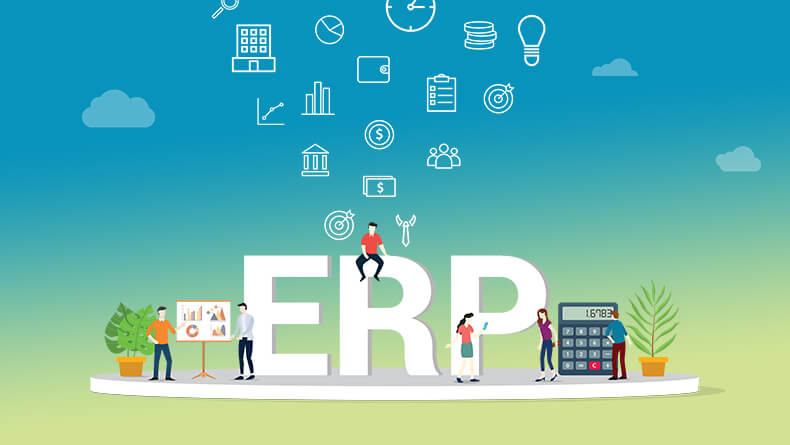- 30 December 2022
- Business, Technology
To run a business effectively, one needs experience, skills, and business acumen. However, without a good software solution to help manage workflows, progress may be limited.
In today’s competitive market, even small businesses must leverage the benefits of modern technology to stay competitive. Every company seeks to implement technology in some form to streamline daily tasks and address roadblocks to further success.
One such technology is business software, such as an ERP system, which facilitates control and management of all processes.
What is ERP software?
ERP (Enterprise Resource Planning) software is a centralized system that helps organizations manage their day-to-day business activities, including project and customer management, inventory control, accounting, risk forecasting, and more. These systems automate routine tasks and streamline business processes by providing a single interface for users to interact with.
ERP applications connect and integrate multiple work processes and enable real-time data exchange between them. By consolidating information from various sources, ERP systems eliminate data duplication and provide a single source of truth. The ultimate goal of using an ERP system is to streamline operations, free up time for employees, and increase business revenue and efficiency by focusing on higher-priority tasks.
What are the advantages of ERP systems?
ERP systems have long been recognized as a leading software solution for businesses, and today they play an even more crucial role in the management of any company. Many large enterprises rely on ERP software, and for some, it is as essential as electricity in their building.
This is because ERP software covers many, if not all, aspects of a business and provides a complete solution that:
Simplifies business management
ERP solutions can effectively connect all activities in your company that require management and employee attention, and facilitate quick communication among different teams in your company, including HR, sales, production, supply, inventory, and customer management.
One major advantage of an ERP system is its ability to greatly reduce the need for paperwork and manual data entry, thereby significantly reducing the risk of human errors that can disrupt the work environment and slow down work processes.
Using ERP software, you can process data automatically, in the fastest and most efficient way, avoiding repetitions. But not only that. If you use such software to manage your business, there is no need to store all your information on paper. Instead, the data is stored in a digital format to be easily accessed and analyzed at any time. Thus, you not only save unnecessary expenses but also help nature.
ERP software enables fast and efficient automatic data processing, eliminating repetitions. Additionally, by using ERP software to manage your business, you can eliminate the need for paper storage and store data digitally for easy access and analysis. This not only saves expenses but also helps the environment.
Improves coordination and efficiency
Teamwork becomes increasingly difficult as the number of your employees increases. The more a business grows, the more critical the need for regular communication between different departments becomes. The lack of fast communication and data exchange can seriously slow down and disrupt the productivity of any business. Not only does this waste money from your company’s budget, it also wastes valuable time that your employees could be using to complete other important tasks.
The ERP system solves this problem because it contains all the data related to your business needed to create good cooperation between the different branches of your company. As a result, this business software reduces communication delays throughout the company, making it more efficient and organized.
ERP solutions significantly accelerate business operations related to the collection and processing of information, which includes various requests and approvals. With their help, you have more control over your business’s efficiency.
Ensures precise planning and accurate reporting
An irreplaceable advantage of ERP applications is their ability to efficiently collect, process, and store information in a common, centralized system. This ensures all important data related to production, supply, sales, customers, and finance are consolidated in one place, instead of scattered in a number of separate databases. By consolidating data in this way, not only is the occurrence of duplicate data reduced but the overall quality of information is also improved.
The analysis and use of data are also facilitated by ERP systems. They not only aid in collecting and storing information, but they also enable effective analysis to inform the planning and development of the company.
Implementing an ERP package grants access to a wide range of analytics and reports, including invoice forms, order confirmations, purchase orders, annual and monthly reports, analytical reports, and executive dashboards among others. This facilitates accurate reporting and analysis to identify new strategies and opportunities for faster development.
Through the use of these analytics and reports, it is possible to easily compare and analyze information without the need for days spent analyzing multiple spreadsheets and emails.
Enables easy development and flexibility
Another irreplaceable quality of ERP systems is the flexibility to scale business operations to match current needs and conditions. With this resource planning system, it becomes easy to adapt to the expansion or reduction of your company at any level.
The use of flexible ERP software allows for easy control of even the most minor changes within the company’s structure, such as hiring new employees, increasing production, adding new products, and interacting with new suppliers, among others. Regardless of the direction of business development, ERP systems can handle all these changes seamlessly.
To ensure optimal development and easy access to management systems from any device, ERP systems can be implemented as web or mobile applications that can run on any type of portable device and can be accessed anytime, anywhere. Additionally, integrating this type of application with a CRM system can lead to faster and more efficient management of customer relationships.
Helps with inventory management
For businesses involved in trading and manufacturing, ERP platforms can be incredibly beneficial. They aid in supply management and enable automatic tracking of inventory to facilitate proper production planning and to ensure that adequate amounts of materials and raw materials are available to complete a job.
By utilizing a well-designed ERP system, businesses can gain control over the supply chain, forecast consumer demand, manage orders, and track sales, among other key features. Integrated information about the schedule of deliveries, sales, and production allows for better inventory management and ensures that all necessary resources are always on hand. These systems also allow for tracking the entire process and communication along the supply chain.
Furthermore, implementing an ERP solution can significantly reduce the overproduction of a business by enabling tracking and evaluation of performance based on cost, errors, and deadlines. This helps to build a more efficient and well-functioning network.
Improves market competitiveness
КERP systems, like other modern technologies, can be leveraged by businesses in any industry to gain a competitive edge in the marketplace. These systems offer valuable insights into the target audience, including interests, characteristics, personal preferences, and preferred modes of interaction. Furthermore, by providing real-time data, modern ERP systems allow for full control over customer interactions, enabling businesses to make data-driven decisions.
Implementing ERP software in your company can help put customer service at the forefront, allowing for fast and efficient support to be offered to customers. This improves customer satisfaction and loyalty, ultimately leading to increased sales and better competitive advantage.



